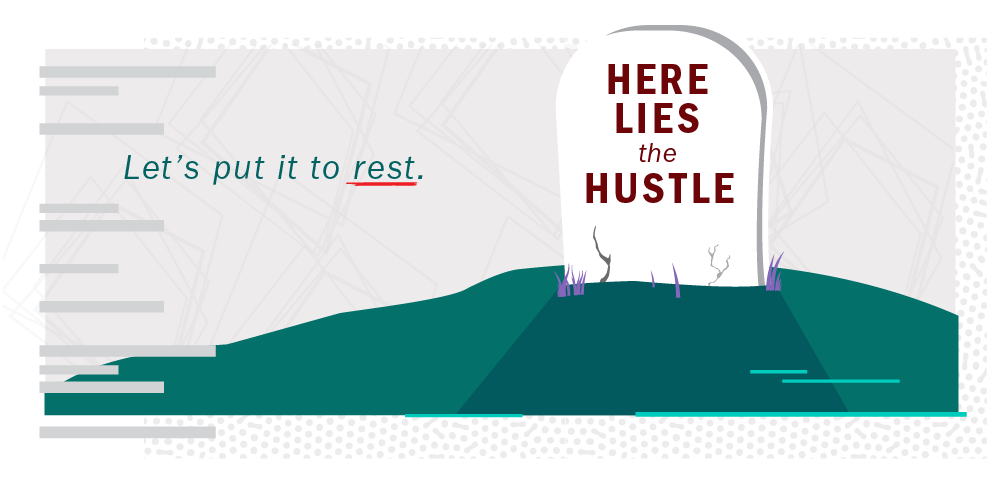
Do the hustle? Maybe not.
No matter the industry you work in, it’s almost impossible not to be scrolling through social media and see the same kind of ad. “Learn how to turn {insert name of established career here} into the side hustle you’ve been looking for.” Is it just us, or is this infuriating? The language in ads like this is belittling, condescending, and dismissive to industry professionals who’ve worked years to become experts in their fields, but that’s not the biggest problem. The real issue is ads promoting “hustle culture” are toxic to the individuals they target. Don’t get us wrong, if the goal is to further education, change careers, and build a better life for yourself then we are all for it! Fan that flame within you and let it burn, but if that’s the case shouldn’t we change the messaging?
What “side hustle” looks like.
“Side hustle” conjures up images of stressful nights and weekends spent away from family and friends, trying desperately to create a business in your precious few free hours. Drive is beautiful, determination is necessary, and tenacity is vital when working for a better life, but hustle has a connotation all it’s own. This brings us to our main point, the toxicity of “hustle culture.”
What exactly is this rhetoric doing to us?
Over the last few years, social media has exploded with posts regarding the word “hustle.” Whether it’s in an affirming meme or an ad for a side business, it’s saturating our news feeds. Study after study is telling us that hustle culture is detrimental to our mental health. Eight out of ten Americans consider themselves stressed and 40% of Americans say they’ve been more stressed in the last year (Thrive Global study 2019), and yet, every time we turn around there’s a new blog or post about what more we could be doing with our lives. So let’s take a look at what this messaging is actually doing to us.
Exhaustion isn’t a badge of honor.
Americans in general, even long before social media, have valued a long day’s work. Our work weeks and hours are cumulatively longer than those of European countries (like The Netherlands for example) and there’s a learned guilt that comes with using well-earned vacation days. The more you work, the faster you get to the top, but where does it end? When have you worked enough, made enough money, accomplished enough to take a break? Ask that question to 20 business people and you’ll never hear the same answer twice. We live in a society where always being “on” and mentally frazzled by work is not only a badge of honor but part of our identity. In her 10 Guideposts for Wholehearted Living, Brené Brown tells us that we must “let go of exhaustion as a status symbol and productivity as self-worth” and “cultivate play and rest.”
You can’t give to others if you’re running on empty.
Play and rest. Most adults will tell you that they don’t have to rest and they aren’t children, so they don’t play. Rest is non-negotiable for humans. Without it, to put it very simply, we die. We’ve come to value anxiety and worry so much that when we do find ourselves in a moment of peace, we worry that we have nothing to worry about. We’ve put ourselves in a race we will never win because the finish line keeps moving. If that’s the case then why not sit down for a lap or two. Self-care isn’t a new idea invented to boost Instagram engagement, though that’s currently what it’s being used for, it’s a real tool to help combat the stress of everyday life. Your car can’t run on fumes and neither can you.
Your car can’t run on fumes and neither can you.
Engage in recreation and be present in your life.
Now let’s look at the other word, play. What Brown means here is to do things that relax you and make you happy. Perhaps that is playing with your children, making jewelry, painting even though you aren’t very good at it, etc.…. In short, hobbies. At red thread, we put A LOT of emphasis on work/life balance. We have novelists, painters, actors, singers, crafters, farmers (and many more) all that make up our tassel. Our Tuesday team meetings are filled with announcements about art shows, musicals, and publications, and it’s the best part of the week. We let go of the word play as we age, but it’s important to remember the sentiment behind it. Play: Engage in activity for enjoyment and recreation rather than a serious or practical purpose.
In conclusion
There’s nothing wrong with working hard, but what is the real value in hustle culture? Most studies will tell you that there isn’t one, and in our opinion, they are right. The “always-on” mentality that hustle culture creates leads to depression, anxiety, hypertension, irritability, hopelessness, low self-esteem, the list goes on. What it absolutely doesn’t lead to is happiness. So do yourself a favor and give yourself a break. Close your eyes, take a breath and ask yourself what’s really important. Chances are the answer is on the other side of the office door.